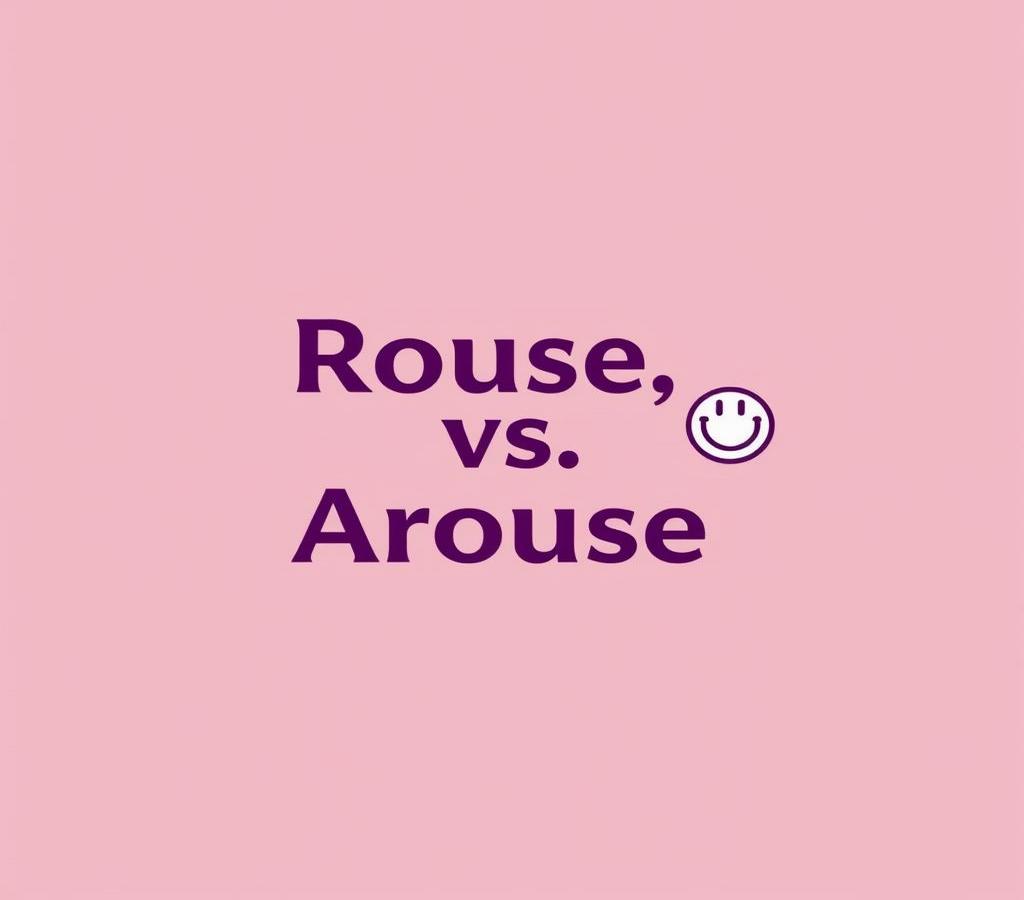Rouse vs Arouse: Grammar Usage & Difference Examples
Understanding the difference between “rouse” and “arouse” can improve your writing and speaking skills. These verbs are often confused, but they have distinct meanings and uses. “Rouse” is typically used when waking someone or stirring action, while “arouse” often means to provoke an emotion or reaction. This article will explore their differences and guide you on how to use each word correctly in various contexts.
Quick Answer
Rouse and arouse are often confused, but they have different meanings and uses:
- Rouse: to wake someone or something from sleep, or to stir up a feeling or activity (e.g., “The alarm roused me from my nap”).
- Arouse: to awaken a feeling or desire, often in a sexual sense (e.g., “The romantic music aroused feelings of passion”).
Remember: if it’s about waking up or stirring up, use rouse; if it’s about awakening a feeling or desire, use arouse.
Why There is Confusion
The English language can often be perplexing, especially when it comes to words that sound similar but have different meanings and uses. The words “rouse” and “arouse” are prime examples. Both verbs are related to the idea of waking up or stirring emotions, but they are not interchangeable. This confusion is understandable, given their similarities and overlapping contexts in which they may appear. Understanding the nuances between “rouse” and “arouse” can enhance your writing and communication skills.
What Does Rouse Mean?
The verb “rouse” primarily means to wake someone up or stir someone from sleep or inactivity. It implies an awakening from physical sleep or a state of lethargy. “Rouse” can also mean to provoke a response or incite action or emotion. For example, you might rouse someone from bed in the morning, or a rousing speech might inspire people to take action.
“Rouse” originates from the Middle English word “rousen,” which means to shake the feathers. Over the years, its usage has evolved, but the core meaning has remained the same – waking or stirring someone or something.
What Does Arouse Mean?
On the other hand, “arouse” tends to have a more emotional or psychological connotation. While it can also mean to wake someone up, it is more frequently used to refer to stirring emotions, feelings, or desires. For instance, you can arouse curiosity, arouse suspicion, or arouse anger.
“Arouse” comes from the Latin word “arrogare,” meaning to demand or crave. Its usage over time has come to represent the stirring or awakening of emotions, making it a powerful word in both literary and everyday contexts.
Differences in Meaning and Usage
Differences in Verb Forms
The differences in verb forms are primarily related to their contexts.
- Rouse: This verb is typically used when talking about waking someone up or stirring them from a state of inactivity. For example, “I had to rouse him from his deep sleep,” or “The teacher’s question roused the students from their daydreams.”
- Arouse: This verb is used in a more figurative sense to imply awakening or stimulating emotions. Examples include, “The news aroused widespread interest,” or “His actions aroused suspicion among his colleagues.”
Differences in Noun Forms
The noun forms of these verbs also differ in their meaning and usage.
- Rouse: The noun form “rouser” can refer to something or someone that wakes up or stirs another person. For example, “The alarm was a reliable rouser,” or “He fancied himself a rouser of public opinion.”
- Arouse: The noun form “arousal” refers to the state of being awakened or stimulated, particularly in an emotional or sexual context. For example, “She felt a sudden arousal of anger,” or “His article led to the arousal of public concern.”
Differences in Adjective Forms
The adjectives derived from “rouse” and “arouse” are “rousing” and “arousing,” respectively, and their uses reflect the verbs’ distinct meanings.
- Rousing: This adjective means exciting or stirring. It often describes something that excites strong feelings or enthusiasm. For example, “The crowd gave a rousing cheer,” or “It was a rousing speech that motivated everyone.”
- Arousing: This adjective is often associated with stirring emotions, desires, or even reactions. It can have a more sensual connotation. For instance, “The movie was emotionally arousing,” or “His behavior was arousing suspicion.”
Synonyms
Having a variety of synonyms at your disposal allows for richer, more precise language use. Below, we will delve into the synonyms for “rouse” and “arouse,” offering alternative words that can be used in various contexts to clarify meaning.
Rouse Synonyms
The synonyms for “rouse” often reflect concepts of waking, stirring, or inciting. Here are some alternatives:
- Wake: To cause someone to stop sleeping.
- Awaken: To rouse someone from sleep or inactivity.
- Stir: To incite action or provoke movement.
- Incite: To encourage or stir up violent or unlawful behavior.
- Provoke: To stimulate or give rise to a reaction or emotion.
- Agitate: To make someone troubled or nervous.
Arouse Synonyms
The synonyms for “arouse” often revolve around the themes of stimulating emotions, desires, or reactions. Consider these words:
- Excite: To stir up emotions or eagerness.
- Kindle: To arouse an emotion or feeling.
- Stimulate: To encourage interest or activity in someone or something.
- Provoke: To stimulate a reaction or emotion, often anger.
- Invoke: To call forth emotions or feelings.
- Trigger: To cause a particular reaction or emotion.
Examples of Usage
Examples are crucial for understanding how to properly use “rouse” and “arouse” in sentences. Here are several examples that highlight their differences and proper usage:
Examples Using “Rouse”
- “The loud noise roused the entire household.”
- “The coach’s pep talk roused the team to play their best.”
- “He was roused from his daydream by the sudden knock on the door.”
- “The villagers were roused to action by the urgent call for help.”
- “This cold weather is enough to rouse anyone from their slumber.”
Examples Using “Arouse”
- “The mysterious disappearance aroused suspicion among the neighbors.”
- “Her inspiring story aroused a sense of pride in the community.”
- “The film aroused deep emotions in the audience.”
- “He managed to arouse feelings of nostalgia with his old photographs.”
- “The allegations aroused significant interest from the media.”
Conclusion
While “rouse” and “arouse” share similarities and can often be confused, they have distinct meanings and uses. “Rouse” is generally used to describe the act of waking someone up from sleep or stirring them from a state of inactivity. Conversely, “arouse” is more often used to describe the stimulation or awakening of emotions and feelings.
Understanding these differences can significantly enhance your clarity in writing and speaking. Whether you are stirring someone from sleep or eliciting an emotion, choosing the right word is essential. By mastering the use of “rouse” and “arouse,” you can express yourself more precisely and avoid common language pitfalls. Ultimately, this nuanced understanding will lead to more effective and impactful communication.







